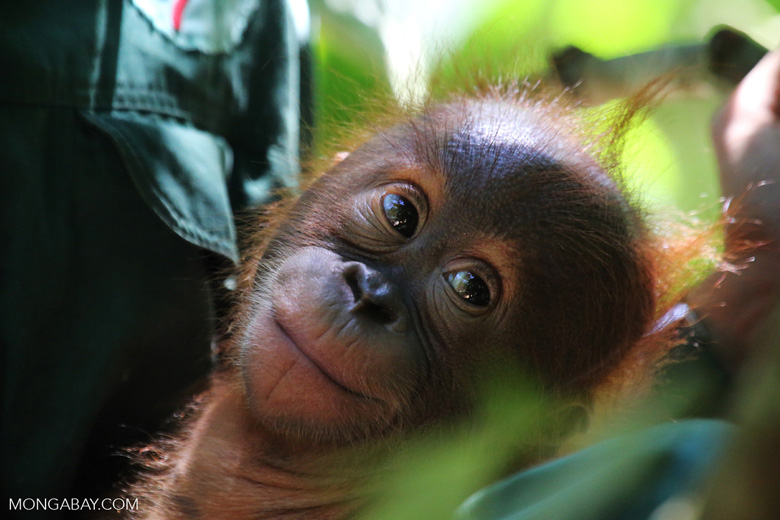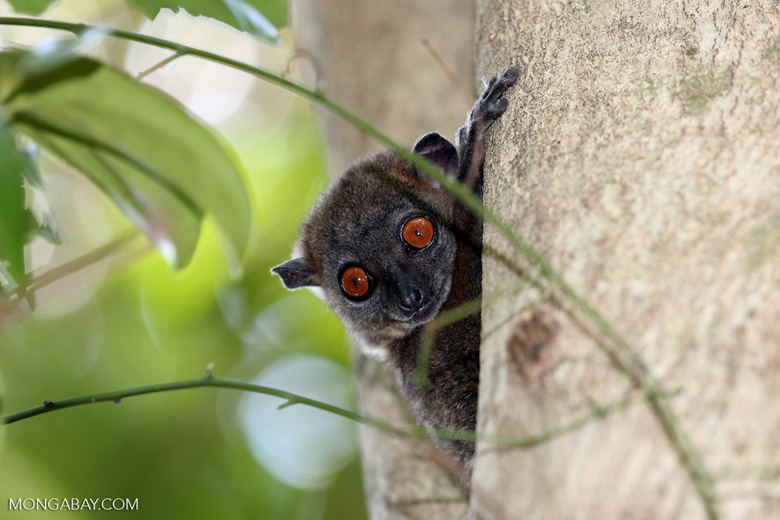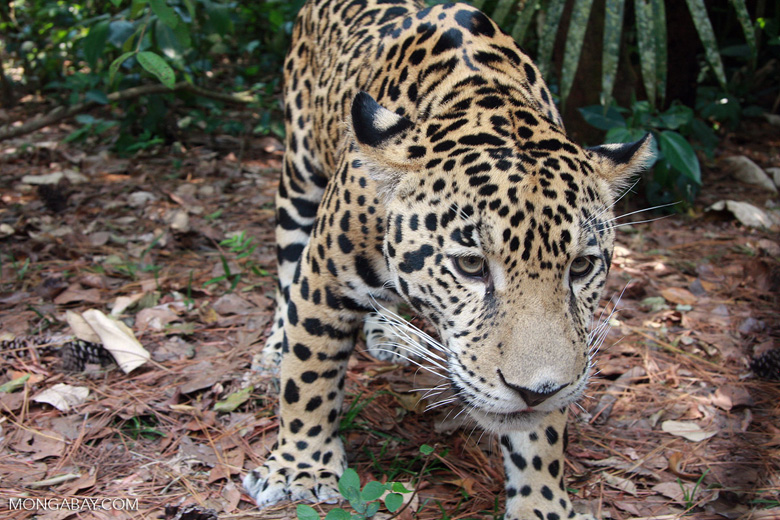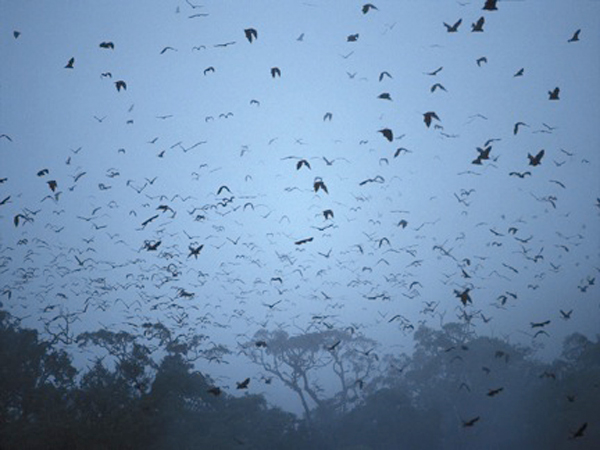Orphaned orangutan (photo)
Baby orangutan orphaned by the palm oil industry when its forest habitat was cleared for a plantation in Sumatra. More orangutan photos.
Ankarana sportive lemur (photo)
Ankarana sportive lemur in Ankarana National Park, Madagascar. A number of lemur species are threatened by logging in Northeastern Madagascar. The majority of lemurs are considered at risk of extinction. More lemur photos.
Plains zebra in South Africa (photo)
Herd of plains zebra in a private reserve near Kruger National Park, South Africa. More zebra photos.
Jaguar (photo)
Peru’s newest national park, Sierra del Divisor, provides habitat for jaguar, along with more than 30 other species of large mammal.
Jaguarundi in Costa Rica (photo)
The jaguarundi (Puma yagouaroundi) is a small cat that lives in a variety of ecosystems across to Central and South America.
A strange lemur for Halloween (photo)
The aye-aye is one of the world’s strangest animals. Found only in Madagascar, this lemur aye-aye befuddled early naturalists with its unusual appearance and behavior. More pictures of the aye-aye.
Pygmy hippo underwater (photo)
A photo of a pygmy hippo underwater at the San Diego Zoo. More photos of hippos.
Leopard stalking its prey (photo)
This leopard is stalking a group of impala in South Africa’s Mala Mala Game Reserve. More pictures of wild cats
White rhino in South Africa (photo)
White rhino near on a private game reserve near South Africa’s Kruger National Park. Since this photo was taken 2 years ago, more than 3,000 rhinos have been slaughtered in South Africa for their horns.
A Field Guide to the Larger Mammals of Tanzania – book review
By Gabriel Thoumi A Field Guide to the Larger Mammals of Tanzania provides the most up-to-date guidebook for trekking in Tanzania. It includes detailed species accounts and delightful photos of 135 of the larger mammals of Tanzania. It is the first book to include both marine mammals and recently discovered species of Tanzania. While Tanzania has over 340 recorded mammal species, over 200 of these are rodents, bats, and shrews. For...
World’s largest (harmless) bat inspires Halloween-worthy tales in the Philippines
By Simon Bradley and Tammy Mildenstein It’s Halloween time again, and around much of the world people are decorating with images of ghosts, vampires, witches, black cats, and, of course, bats. For the superstitious, there may be nothing scarier than the flying foxes of the Philippines, whose 2-meter wingspans make them the largest bats in the world! In keeping with a popular fear and mistrust of nocturnal animals, Philippine flying...
Endangered Malayan tapir baby born at Minnesota zoo
Last Saturday, a female Malayan tapir (Tapirus indicus) was born at the Minnesota Zoo, the first baby tapir for the zoo in over 20 years. “Malayan Tapirs are an endangered species and every birth is important to the population,” said Tom Ness supervisor of the zoo’s Tropics Trail at the Minnesota Zoo, located in Apple Valley. The only tapir species found outside of Central and South America, Malayan tapirs are...
Oh deer: world’s smallest deer born at Queen’s Zoo
By Alexander Holmgren The first week of July marked one of the as the World’s cute as the worlds smallest deer was born in the Wildlife Conservation’s Society Queen’s Zoo. The doe, a member of the endangered Pudu species (Pudu puda) weighs approximately one pound at birth and will only grow up to be twenty pounds as an adult. The Pudu are one of nature’s most extraordinary creatures. The Pudu is the smallest deer species in existence...
Eats, shoots and leaves, an essay on giant pandas
Giant panda in Chengdu in South Western China. Photo by: Shubhobroto Ghosh. By: Shubhobroto Ghosh Please note : The opinions expressed in this article are those of the author and not representative of the viewpoints of any organization. “We have to remember that what we observe is not nature herself, but nature exposed to our method of questioning” – Werner Heisenberg, Nobel Prize winner in Physics (1932) in Physics...
Update: interview on toxic pesticide used to kill wildlife (and endangering people) in Kenya
An interview in four parts with Paula Kahumbu, Executive Director of WildlifeDirect, provides detail and context on the use of the neurotoxic pesticide Furadan to kill lions and birds en masse in Kenya. Lions are down to around 2,000 individuals in Kenya. Kahumbu, recently awarded an Emerging Explorer by the National Geographic, and WildlifeDirect are working to pressure the government to estimate the environmental and human cost of...
Toxic pesticide used to kill birds by the thousands (warning: video is graphic)
A new video from WildlifeDirect shows the brutal impacts of the neurotoxic pesticide Furadan being used intentionally to kill entire flocks of birds, which are later sold as meat. Ducks, pigeons, and storks are often targeted. The process is brutal. “Based on a survey I did in 2009, 6,000 birds were killed every month. Tens of thousands are killed every year. I’m very concerned and I think man is at risk too–that is...
Activism: funds needed to replant forest for nearly-extinct loris
Note: as a news organization mongabay.com does not endorse the action below, but believes its readers may be interested in taking action or discussing the issue in comments. Horton Plains slender loris. Photo courtesy of EDGE. Researchers estimate that only 80 Horton Plains slender loris (Loris tardigradus nycticeboides) survive in the world. After believed to be extinct ZSL EDGE rediscovered the subspecies in a dwindling Sri Lanka...
What does a baby moose look like? (photos)
Moose and mom are doing fine. Photo courtesy of ZSL’s Whipsnade Zoo. It’s true that moose, also known as European elk (Alces alces), are odd looking animals, yet that doesn’t prevent their babies from being as endearing as any others. This baby moose, named Chocolate (get it?), was born at Zoological Society of London’s (ZSL) Whipsnade Zoo in late May. The moose are apart of the European Breeding Program. Photo...
Antelope release! (photos)
Red hartebeest release. Photo courtesy of Colchester Zoo: Action for the Wild. Three antelope species were recently released at the Umphafa Private Nature Reserve in KwaZulu Natal, South Africa in an ongoing effort to restore an over-cultivated area. In all 7 impala, 21 red hartebeest, and 22 blue wildebeest were released. “These recent releases are exciting developments for UmPhafa. The releases of the wildebeest represent the...













